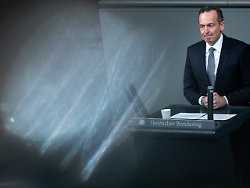Transport Minister in the “early start”
Wissing: Many more refugees are coming
03/18/2022 09:43 am
Thousands of people from Ukraine still arrive in Berlin every day. The capital is now overwhelmed with the number of refugees – but the distribution to other federal states is not yet underway. In the “early start” on ntv, Transport Minister Wissing calls on the other countries to do more.
Federal Transport Minister Volker Wissing assumes that from now on many more refugees from the Ukraine will come to Germany than before. Most people are now being transferred from Poland to the west because many cities there are at their limit, according to the FDP politician in “ntv Frühstart”. “That’s why you have to be prepared for a significant increase in the number of refugees.”
Wissing criticized the still unwillingness to accept many federal states. “I believe that many in the countries have underestimated the problem.” You can see that in the numbers reported to the federal government. “On some days, 1,000 admission capacities were reported. That’s far too little.” The Polish capital of Warsaw alone has taken in 320,000 refugees. “Constantly saying we don’t have the capacity doesn’t help to solve the problem.”
The transport minister declared his willingness to use special trains right from the start of transport in Poland. “However, we would then have to know where they should stop. And these would then have to be reception and distribution centers that can take in a larger number of refugees.” Such capacities had not been available in the last few days. “One has to understand that a train with maybe 700 refugees sitting on it cannot simply be directed to a station where people then get off and nobody is waiting for them.”
“We help where we can”
Wissing rejected criticism of the bad management of the federal government. “We’re doing exemplary work here when it comes to transporting refugees. We help where we can.” Above all, he praised the commitment of Deutsche Bahn and the many volunteers in Germany and Poland. The refugees could now move freely in the Schengen area. In most cases, they initially chose the route to Berlin. “This leads to a concentration here that is difficult to achieve.”
In the discussion about high fuel prices, Wissing rejected a speed limit on German roads and a car-free Sunday. Both are available free of charge, “but it would not solve the problem that fuel prices are so high and that people who commute to work have to refuel even in these times of crisis.” People have a financial problem. A car-free Sunday does not help to finance the costs. “We should now discuss concrete measures, as Christian Lindner suggested.” The finance minister advocates a state fuel subsidy. Instead, Greenpeace had spoken out in favor of introducing a speed limit until the end of the war in order to reduce fuel consumption through lower speeds.
